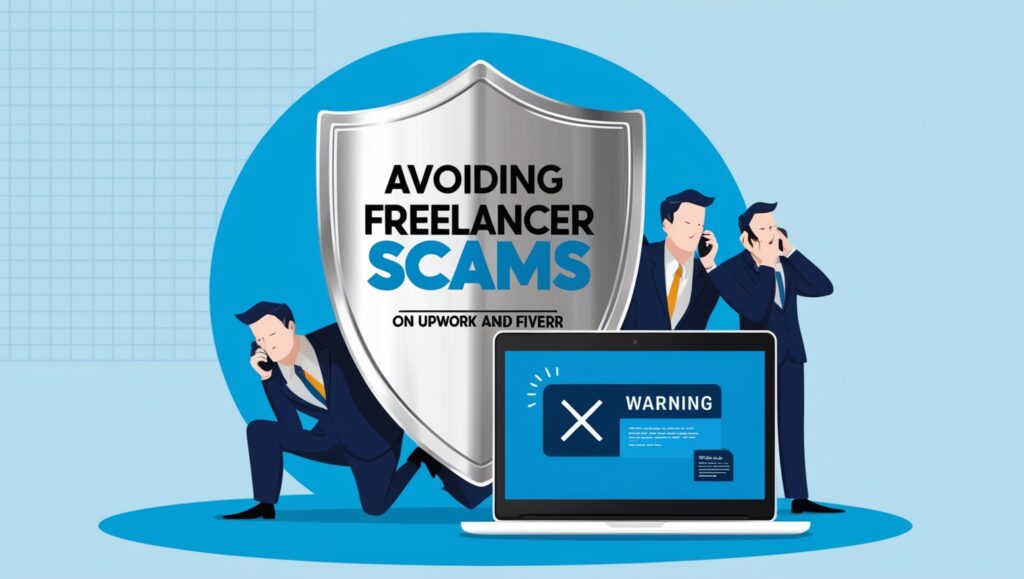Avoiding freelancer scams has become more critical than ever as platforms like Upwork and Fiverr are popular. With millions of daily transactions, these freelancing websites attract legitimate clients and scammers looking to exploit unsuspecting freelancers. In this guide, we’ll explore the different types of scams freelancers may encounter and provide actionable tips to help you protect yourself and your hard-earned money.
For more detailed insights on protecting yourself from online scams, visit our full guide on Avoiding Freelancer Scams on Upwork and Fiverr.

In this guide, we will explore the different types of freelancer scams, especially on Upwork and Fiverr, and provide you with actionable tips on protecting yourself. Let’s dive in and learn how to stay safe while freelancing online.
What Are Freelancer Scams?
Freelancer scams are fraudulent schemes designed to exploit freelancers for money, services, or personal information. These scams can come in various forms, from fake job postings to clients asking for free work. While platforms like Upwork and Fiverr implement safeguards, scammers continuously adapt, making it crucial for freelancers to stay alert.
Why Are Upwork and Fiverr Common Targets for Scammers?
Upwork and Fiverr, two of the largest freelancing platforms globally, host millions of daily transactions. While their size and popularity make them excellent freelancer resources, they also make these platforms appealing to scammers. The vast number of users means scammers can often operate anonymously, slipping through the cracks.
Understanding Freelancer Scams on Upwork and Fiverr
How Common Are Freelancer Scams?
Freelancer scams on Upwork and Fiverr are more common than many users realize. New freelancers are frequent targets since they might need to be more familiar with platform policies and unaware of red flags.
Types of Freelancer Scams on Upwork
Upwork offers a variety of protections, but scammers still need help finding loopholes. Some of the most common scams include:
- Fake job postings: Scammers create counterfeit jobs to lure freelancers into providing free work or handing over sensitive information.
- Payment delays: Some clients may delay or disappear after completing the work.
- Unrealistic payment offers: Some scammers entice freelancers with unusually high payments, only to pull back after receiving partial work.
Types of Freelancer Scams on Fiverr
On Fiverr, scams often involve:
- Fake orders: Clients place fake orders, receive the work, and then cancel the payment.
- Phishing attempts: Some clients ask freelancers to communicate outside the platform, exposing freelancers to potential phishing schemes.
- Requests for free services: Scammers ask for “samples” or “test tasks” to get work done for free.
Avoiding Freelancer Scams on Upwork
Red Flags to Watch for on Upwork
If you’re working on Upwork, here are some red flags to be aware of:
- Unverified payment methods: Always verify a client’s payment method before accepting a job.
- Vague job descriptions: A legitimate client will provide detailed descriptions of the job they want completed. Be wary of vague or unrealistic postings.
- Requests for off-platform communication: Always keep communication within Upwork. Off-platform conversations could expose you to scams.

Protecting Yourself from Scams on Upwork
Upwork offers several tools to protect freelancers, such as:
- Escrow for payment protection: Upwork’s escrow system holds the client’s payment until you deliver the work. Only when the client approves the work will the payment be released, protecting both parties.
- Hourly payment protection: For hourly contracts, Upwork has a time-tracking system to ensure you’re paid for every hour you work.
Common Upwork Scams and How to Avoid Them
- Fake job listings: Avoid listings that offer unrealistically high pay for simple work. Always check the client’s hiring history and reviews.
- Unverified clients offering large payments: Be wary of clients who provide substantial payments without verification. Always request that they verify their payment method before beginning work.
Avoiding Freelancer Scams on Fiverr
Identifying Fiverr Scam Gigs
On Fiverr, always be cautious of:
- Gigs with unrealistically low prices: Scammers often lure freelancers with promises of large, repeat business for meager pay. Avoid gigs that seem too good to be true.
- Sellers with few reviews or low ratings: Check the seller’s profile, reviews, and previous work before accepting an offer.
Best Practices to Protect Yourself on Fiverr
- Verifying reviews and ratings: Ensure the client has a solid review history before engaging in work.
- Safe communication within the platform: Keep all communications and transactions on Fiverr to benefit from their dispute resolution process.
Common Fiverr Scams and How to Avoid Them
- Fake orders and requests for personal information: Beware of clients asking for sensitive information like your email, passwords, or personal identification details.
- Scams involving payments outside Fiverr: Some clients may trick freelancers into accepting payments outside Fiverr. This is against Fiverr’s rules and will leave you unprotected.
General Tips for Avoiding Freelancer Scams
How to Verify Genuine Freelance Clients
One of the best ways to protect yourself is by verifying the legitimacy of clients.
- Checking reviews, ratings, and past projects: Upwork and Fiverr allow freelancers to view client feedback. Avoid clients with bad reviews or no work history.
- Always request payment through the platform: Never accept payments outside Upwork or Fiverr, as it leaves you vulnerable to scams and platform penalties.
How to Avoid Fake Job Listings
Fake job listings often promise unrealistically high pay for simple tasks. Check for inconsistencies in the job description and research the client’s profile. It’s best to pass on the opportunity if something doesn’t add up.
Spotting Unrealistic Payment Promises
Offers that promise high payments for little work are red flags. Always question clients offering significantly more than the average rate, as scammers commonly use this tactic.
Avoiding Off-Platform Communication Scams
Always keep communications on the freelancing platform. Platforms like Upwork and Fiverr protect freelancers only if all transactions and conversations happen within their systems.

Freelancer Protection Tips for Upwork and Fiverr
How to Secure Your Personal Information
Scammers often ask for personal information, like bank account details or your identification. Protect yourself by:
- Never share sensitive information: Only share necessary details consistently through the platform’s secure channels.
- Using Two-Factor Authentication (2FA): Enable 2FA on both Upwork and Fiverr to add an extra layer of security to your accounts.
Steps to Take if You Encounter a Scam
If you believe you’ve been scammed, follow these steps:
- Report the scammer to the platform: Upwork and Fiverr have reporting systems to handle scams. The sooner you report, the better your chances of recovering your payment.
- Document all communications: Keep records of all conversations, agreements, and payments to protect yourself.
Real-Life Examples of Freelancer Scams
Case Study: Avoiding Freelancer Scams on Upwork
In one case, a freelancer was offered a high-paying job transcribing audio files. After completing several hours of work, the client disappeared, and the payment was never made. This freelancer needed to check the client’s payment verification status, a mistake that could have been avoided. Visit Upwork’s Safety Guidelines
Case Study: Avoiding Freelancer Scams on Fiverr
A freelancer on Fiverr was asked to create multiple design samples for a client who promised future work. After delivering the samples, the client disappeared without paying, citing that the samples didn’t meet expectations. This freelancer could have protected themselves by only delivering work through Fiverr’s order system, ensuring payment security. Visit Fiverr’s Security Tips
Conclusion
Freelancing on platforms like Upwork and Fiverr offers excellent freelancer opportunities, but it’s crucial to remain vigilant to avoid scams. By following the tips outlined in this guide, such as using platform protections, verifying client details, and avoiding off-platform communications, you can significantly reduce the chances of falling victim to scams.
Take action today! Be cautious, protect your hard work, and use every tool available to avoid freelancer scams.
Call to Action (CTA):
If you’ve found this guide helpful, share it with other freelancers who might benefit from learning how to avoid scams on Upwork and Fiverr. Stay safe, and always keep learning!



